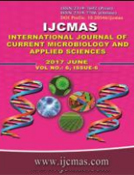


 National Academy of Agricultural Sciences (NAAS)
National Academy of Agricultural Sciences (NAAS)

|
PRINT ISSN : 2319-7692
Online ISSN : 2319-7706 Issues : 12 per year Publisher : Excellent Publishers Email : editorijcmas@gmail.com / submit@ijcmas.com Editor-in-chief: Dr.M.Prakash Index Copernicus ICV 2018: 95.39 NAAS RATING 2020: 5.38 |
Disease incidence is the most impeding factor in the development of shrimp aquaculture industry. Most of the disease incidence in shrimp aquaculture is attributed to viral pathogens. But more recently Enterocytozoon hepatopenaei (EHP), a microsporidian parasite, has emerged as a serious pathogen reported to be associated with white faecal syndrome (WFS) and retarded growth which is referred as hepatopancreatic microsporidiosis in cultured pacific white leg shrimp (P. vanammei) in many of the shrimp growing countries of Asia. In the present study, it is reported that the prevalence hepatopancreatic microsporidiosis in the P. vannamei shrimp farms in Thiruvallur district. A preliminary study was conducted for screening EHP with a total number of 54 samples comprising of shrimp’s hepatopancreas, post larvae, faecal matter and soil by a nested polymerase chain reaction assay. The results showed that 10 samples were positive for EHP either in the first step or in the second (nested) step PCR with the prevalence of 18.51%. This report alerts the shrimp farmers to undertake suitable management measures to prevent the spread of hepatopancreatic microsporidiosis and to avoid the disease in subsequent culture operations to improve the production and sustainability of shrimp culture.
 |
 |
 |
 |
 |